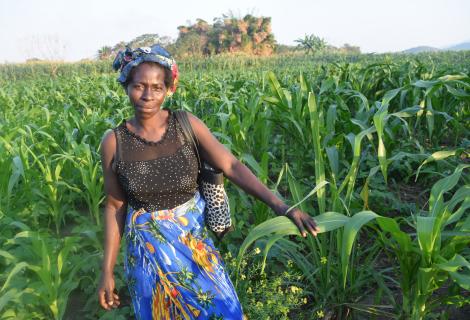Protecting the grass under elephants

To mark International Day of Rural Women, Fletcher Simwaka, communications officer at ActionAid Malawi, makes the case for a strong, gender-just binding UN treaty to ensure transnational companies respect human rights in their global operations.
It’s been told countless times how important transnational corporations (TNCs) are to developing countries like Malawi. Through corporate tax from the TNCs, the governments have been able to generate revenue to finance various social services for the citizens. In some commendable cases, TNCs embark on corporate social responsibility initiatives such construction of school blocks, health facilities, bridges, you name them.
But, as the old adage goes, not all that glitters is gold. In many instances, especially in Malawi, TNCs have ended up pushing the poor, especially women, in further depths of poverty. This is mainly due to the fact that the power and global reach of TNCs today has far outstripped the ability, and in many cases, the willingness, of many governments to hold them accountable and act in the interests of people who have elected them. Quite a sad reality.
In Malawi, what comes fast to mind is how smallholder farmers, especially women, are losing their customary land to TNCs in form of crop diversification initiatives. Not a long time ago, Malawi was told by international development aid to diversify its crop yield away from tobacco, which makes a whopping 70 percent of the country’s earnings. Malawi fell for the bait and is yet come back to her senses. The move involved developing land for sugarcane growth. Now, since sugarcane growth is most profitable when done over a large scale with capital investment, it’s a tall order for smallholder farmers to take advantage of the windfall, it at all. This leaves development of such a land in the hands of wealthy private companies.
A case in point is the land near Dwangwa in Nkhotakota and Nchalo in Chikwawa, the central and southern region districts of Malawi, respectively.
In both cases, private companies have acquired land to grow sugarcane, thereby throwing the helpless and landless smallholder farmers under the speeding bus. Recent studies have shown that the land deals pertaining to the sugar plantations have been concluded by highly corrupt traditional authorities despite resistance from communities.
Most heart-rending is the fact that such land deals are conducted without knowledge of the locals. At best, the owners or users of the land are only subjected to representative consultations. In all such tragedy, women's voices are reduced to silent whimpers, mainly due to the over-bearing patriarchal cultural systems.
Eventually, basic human rights such as the right to food and right to economic activities for smallholder farmers are trumped upon by the huge “elephant feet” of the investors.
It also goes without saying that the most immediate impact of land grabs is a worsening inequality in the ownership of land, as it is mostly the better off and foreigners who are able to get land at the time per capita land ownership in Malawi has greatly diminished.
As if that’s not bad enough, under the New Alliance for Food Security and Nutrition – the G8 Alliance, ten African countries, including Malawi, have signed up to main strategy launched in 2012 to support agriculture in Africa.
Within this framework, Malawi has agreed to ‘release’ 200,000 hectares for large-scale commercial agriculture under the New Alliance, leading to further dwindling of arable land.
Despite the human rights issues, there hasn’t been any binding international human rights legal framework for TNCs and the voluntary accountability approach favoured by corporations has failed to prevent abuse or deliver access to remedy and justice for violations committed by TNCs. Unacceptable!
This is why the binding gender-just international accountability framework for TNCs was needed by yesterday. The treaty actually speaks to the 2030 Sustainable Development Goals, especially on economic justice.
The treaty must be hailed for taking cognizance of the fact that achieving substantive gender equality means making rights for women real. Under the treaty, states are obliged to prevent and address human rights violations resulting from corporate practices under international human rights law.
One hopes the treaty grows sharp teeth quick enough to rescue smallholder farmers, especially women suffering under the weight of human rights abuses from TNCs.


